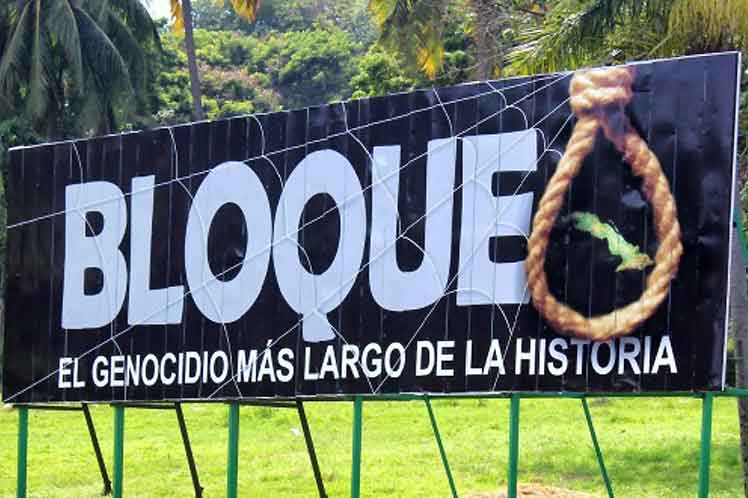Havana, Cuba: After almost a year in power, US President Joe Biden shows no intention of fulfilling his electoral promise to restart the thaw with Cuba; on the other hand, his policy against the Island has been strengthened, Prensa Latina publishes.
According to the Cuban Minister of Foreign Affairs, Bruno Rodríguez, the economic, commercial and financial blockade of the United States constituted the greatest obstacle to confronting Covid-19 in the country, which had its most complex stage in 2021.
During the pandemic, the largest of the Antilles faced the North American siege, already intensified with 243 measures dictated by the administration of former President Donald Trump (2017-January 2021), which remain intact and swell under the current president’s government.
These include keeping the island on the unilateral list drawn up by Washington of countries that, in its opinion, do not contribute sufficiently to the fight against international terrorism.
As a result of these sanctions, the Cuban health system was deprived of the acquisition of technologies, medicines and adequate medical supplies such as gloves, masks and lung ventilators, to face the health emergency in hospitals.
The blockade measures force Cuba to look for intermediaries to access certain products, pay more for insurance and freight, and increase the commissions applied by banking-financial entities, which significantly increases the expenses that the Island must assume.
According to the page of the Central Bank of Cuba, only in 2020 there were damages to the banking system of the Caribbean island in 191 actions associated with 99 foreign financial entities; a situation that worsened during the year that ended with the persecution of the island’s transactions.
According to Rodríguez, the US siege has a daily cost of between 12 and 15 million dollars for the Cuban people, and affects all spheres of the economy.
INCREASE IN SANCTIONS
Biden administration opportunistically increased sanctions against Cuban companies in the midst of the international epidemiological and economic crisis in order to suffocate the economy, create unrest in the population and provoke a regime change.
“The imperialist plan is to help the pandemic cause deaths and uncontrollable numbers of infections,” denounced Carlos Fernández de Cossío, director general of the United States of the Ministry of Foreign Affairs.
As part of this strategy, an intense media campaign of discredit is promoted simultaneously from the northern nation, fueled by the use of social networks, to encourage protests and create an image of Cuba as a failed state that justifies the maintenance and strengthening of that policy.
Recently, in an appearance before the diplomatic corps accredited here, Foreign Minister Bruno Rodríguez denounced the persistent attempts by Washington to subvert the constitutional order through the organization and financing of external and internal agents, which he described as a serious act and in violation of International Law.
He also denounced the participation in this purpose of high officials of the White House, other North American agencies and governmental figures of that country.
This approach is used to intensify the siege against the island, based on campaigns with strong communicational machinery based on lies, he asserted.
NEW THREATS
Faced with the call for the failed counterrevolutionary march on November 15, which was described as illegal and illegitimate by the island’s authorities, senior US officials advanced threats of more sanctions against Cuba.
On November 8, after 10 months of Biden’s rule, Jake Sullivan, his National Security adviser, stated in an interview with CNN that “circumstances changed” in the strategy towards the island after riots occurred in several cities of Cuba on July 11 and 12.
But long before those events, Washington had made it clear that it would not substantially change Trump’s policy on that issue.
In April of this year, the adviser to the North American dignitary for Latin America, Juan González, affirmed that in matters of policy towards Cuba, Biden “is not Barack Obama” -who began a process of rapprochement with the island- and suggested that the review of that strategy was not a priority for the current administration.
Five months later, the US president signed the extension, for another year, of the Trade with the Enemy Act, one of the White House statutes that supports the blockade against Cuba.
The memorandum signed by the president of that northern country states that ?the continuation of the exercise of these authorities with respect to Cuba for one year is of national interest? of his country, and sets the date for a new review as September 14, 2022.
The repeated prolongation of the blockade ignores the rejection of the absolute majority of the world community, expressed last June, on its twenty-ninth occasion, by the United Nations General Assembly.
This time, 184 countries expressed their support for the resolution Necessity to end the economic, commercial and financial blockade of the United States against Cuba, presented by the island, while two voted against (the United States and Israel) and three abstained.
Faced with this scenario of worsening hostility from Washington, however, international solidarity with the island grew, expressed in pronouncements and concrete actions to help governments, parliamentarians, international organizations, people of good will and Cubans living abroad.
Tons of medical supplies, food and medicines arrived in Cuba to help face the complex epidemiological and economic situation derived from the pandemic and the US siege.
Despite the persistence of Washington’s policy, this Antillean nation will end 2021 with the entire vaccinable population immunized against Covid-19 with its own injectables, including those of pediatric age (2 to 18 years), and immersed in a battle for economic recovery, with the gradual return to normalcy.

